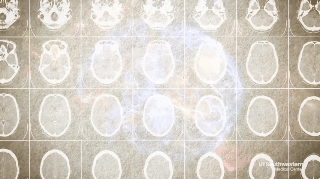Some things will decline as we get older — that’s inevitable.
Physical strength, balance and endurance erode, our eyesight worsens, women quickly lose bone mass after menopause, and male testosterone levels drop.
Cognitive decline has always been a part of aging, too, but can something be done to stop that and turn it around? A new clinical study shows that cognitive training in older adults can make their brains function as if they’re much younger.
Results indicate that when it comes to preventing cognitive decline, staying mentally active may be more vital than staying physically active. And with life expectancy continuing to increase, that could have big implications.
Sandra Bond Chapman is founder and chief director of the University of Texas at Dallas’ Center for BrainHealth. On KERA’s Think, she talked with guest host Courtney Collins about the center’s clinical study, most recently published in the journal, “Neurobiology of Aging.”
Interview Highlights
About the study
The 12-week study involved healthy people between the ages of 50 and 70 who didn’t have any issues with their brain, like dementia, or major problems, like heart disease. The researchers wanted to see what benefits the participants received from the cognitive training program while being sedentary.
“The brain is the only organ in our body that we think about after something’s gone wrong,” Chapman says. “We’re definitely interested in people that do have problems…but we wanted to see [if] could you do something even in a healthy brain to build resilience.”
Chapman says a person’s average peak brain years are between age 35 and 40, but the average lifespan is double that.
“We’re living half of our life with a healthy brain in a state of decline,” she says.
The idea behind the study is to strengthen the brain's abilities to prevent and protect it from greater decline.

About the SMART program
Chapman has developed the SMART program, which stands for Strategic Memory Advanced Reasoning Training, at UT Dallas over the last 25 years to study what can go wrong in the brains of healthy people. The program looks at people’s “strategic attention ability” — how well someone is able to focus on and block out information, she says.
With technology deeply integrated in our daily lives, “we’re literally not able to block out information,” she says. The brain “changes moment to moment by how you use it," so constant interruptions are conditioning our brains to look forward to distraction before it even happens.
The SMART program also looks at the brain’s ability to synthesize information, distilling something down to its essence and applying it to our lives, and to innovate, or find new ways to do something, which is one of the most powerful ways a person’s brain works.
How SMART strategies were used in the study
In the first part of the training, participants are taught nine core strategies, Chapman says. To remember some of them, think of the acronym “FIRST.” Here’s what each letter means:
- Focus: Spend at least 30 to 45 minutes twice a day uninterrupted by noise, technology or people.
- Innovate: Think of new ways to do things or have conversations. The brain receives a “ping” of dopamine, the “brain’s wonder drug,” when it creates a new thought or learns something.
- Respite: Rest your brain for at least five minutes, five times a day. The brain’s power to think more deeply comes after resting it.
- Synthesize: Exercise your deeper analytical mind by consuming information, as in a news article, summarizing it and applying it in your daily life.
- Technology time-out: Step back from screens multiple times a day for at least 30 or 45 minutes to build stronger pathways in your brain.
Why sleep is so important for brain health
Sleep is one of the most powerful ways for our brain to be strengthened, Chapman says. When your brain goes into a deep sleep mode — probably in the sixth hour — it even cleans out toxic waste, like beta amyloid, she says.
“Your brain can almost have like a housekeeper that cleans that up,” she says.
Without good sleep, the brain is sluggish the next day. The brain performance institute at UT Dallas plans to offer sleep studies in the future because it’s so important to brain health, Chapman says.
To listen to the entire interview, stream or download it or subscribe to the Think podcast.



